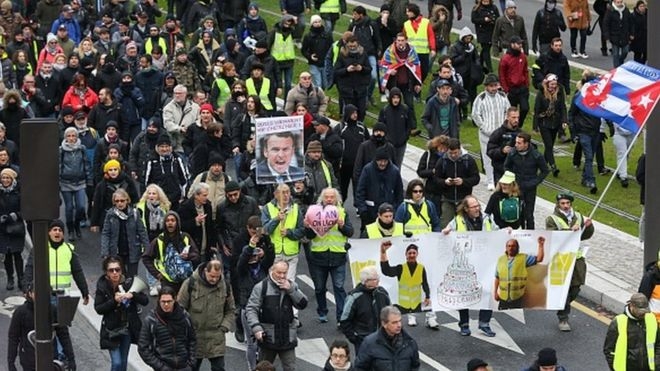Violence flares as yellow vests mark one year

Police in Paris arrested more than 100 people as protests to mark the first anniversary of the anti-government yellow vest movement turned violent.
Yellow vest (gilets jaunes) rallies took place nationwide on Saturday, a year after they first erupted.
Tear gas and water cannon were used by police in Paris, where thousands of protesters thronged the streets.
Rioters unleashed some of the worst violence the city has seen in months.
With many clad in black and wearing masks to hide their faces, rioters in parts of the city burned barricades, vandalised banks, set rubbish bins on fire and hurled cobblestones at police.
By Saturday evening, Paris police said 147 people had been arrested across the capital.
The nationwide protests were intended to send a message to French President Emmanuel Macron, whose government has been accused of ignoring the needs of ordinary citizens.
The protests first erupted in November last year over fuel price rises, but grew to cover wider grievances, including stagnating wages, living costs and economic inequality.
Mr Macron attempted to quell the protests with promises of tax cuts, higher pensions and reforms, but many still feel he has not done enough.
"We're here even if Macron doesn't like it," demonstrators chanted as they marched through Paris on Saturday.
Elsewhere in the city, demonstrators and police clashed near the Porte de Champerret, close to the Arc de Triomphe.
"We are a bit disappointed that this has descended into violence," said one protester, who travelled from eastern France to Paris to mark the first anniversary.
There were also skirmished between police and protesters in other cities, including Bordeaux, Nantes and Lyon.
Much of the anger is directed at Mr Macron, who came to power in 2017 vowing to face down protesters and drive through long-postponed economic reforms.
One of Mr Macron's least-popular measures, early in his presidency, was to scrap a special wealth tax.
Yellow vest protesters accuse Mr Macron of protecting the Parisian elite, especially the rich, while neglecting the hardship of citizens in the provinces.
